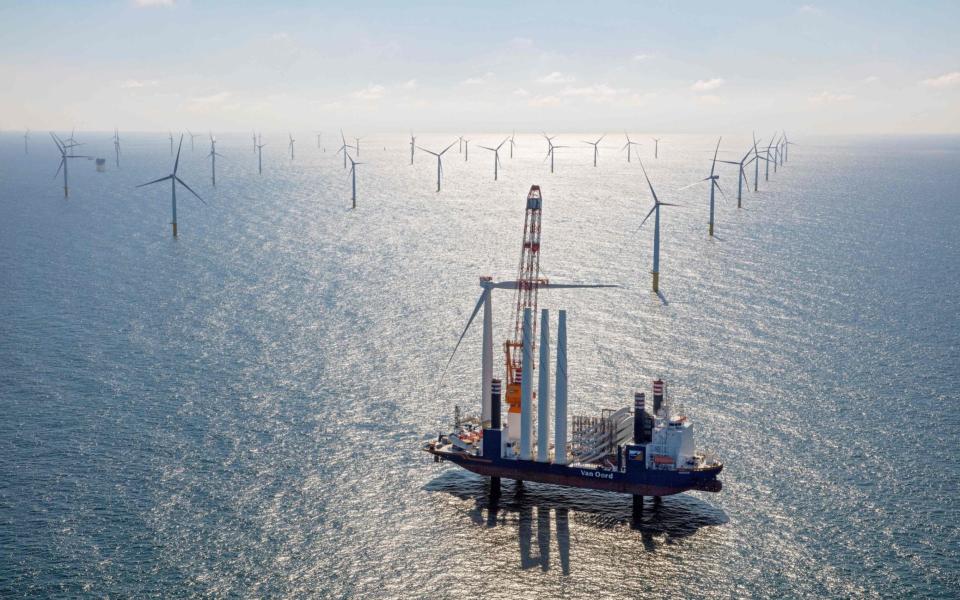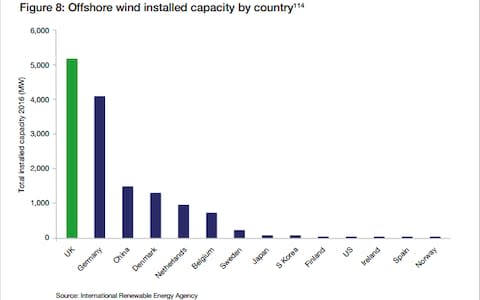UK green strategy open to powering more offshore wind than planned

The Government has left the door open for a bigger than expected boom in offshore wind power in the next decade to power low-carbon economic growth.
Ministers are hoping to tackle the UK’s lagging productivity and boost economic growth by betting on the low-carbon sector, which in recent years has brought a surge in skilled jobs across the country.
Offshore wind power has emerged as a key success story in the green growth agenda and the strategy outlines plans to consider going further to support the sector by rolling out more than the 10GW capacity of offshore wind initially planned for the 2020s.
The strategy paper, which contains more than 50 major policies and plans, said that “provided costs continue to fall” the Government would consider opportunities for additional projects beyond the 10GW cap in order to support high-value jobs and a sustainable UK industry, which can export goods and services around the world.

Business Secretary Greg Clark pointed to the offshore wind sector as an example that should be replicated across the economy.
“If we get it right, we will not just deliver reduced emissions, but also cleaner air, lower energy bills for households and businesses, an enhanced natural environment, good jobs and industrial opportunity. It is an opportunity we will seize,” he said.
The sector is considered a key benchmark because it passed Government’s triple test for supporting low-carbon opportunities: all such projects should offer a clear path to reducing carbon, show a clear cost reduction trajectory, and offer the UK a world-leading position, said Claire Perry, the climate change minister.
Other areas in which Government is preparing to act include heating, transport, energy efficiency, and the return of carbon capture and storage technology (CCS), which can strip and bury carbon emissions from industrial plants.
Government has pledged almost £100m across innovation areas, and £100m to developing CCS. These commitments follow Government's previous pledges to ban the sale of combustion engine cars by 2040 and an end to coal-fired power generation by 2025.
“The unstoppable global shift towards low-carbon technologies gives the UK an unparalleled opportunity. By focusing on clean growth, we can cut the cost of energy, drive economic prosperity, create high value jobs and improve our quality of life,” Ms Perry said at the launch of the strategy.

Juergen Maier, boss of manufacturing giant Siemens, said the strategy offers up "a great opportunity for Great Britain". The group has set up blade manufacturing in Hull and plans to cut its own carbon footprint by 50pc by the end of the decade and become a "zero carbon company" by 2030.
Hugh McNeal, the chief executive of Renewable UK, also welcomed the the strategy, which was unveiled just one day after the Government announced a third funding auction in which wind farms based on Scottish islands will also be able to take part.
“Government is clear that clean growth is a priority for the UK, and that the low-carbon sector can help to increase the competitiveness and productivity of our economy in the decades ahead, creating high-value jobs as well as taking effective action on climate change,” he said.
“However, what’s missing is clarity on how the lowest-cost technology, onshore wind, can deliver for UK consumers,” he added.

 Yahoo Finance
Yahoo Finance 